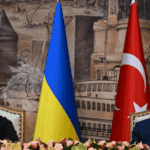The Kurdistan Workers’ Party (PKK) announced on Monday that it is dissolving its organizational structure and permanently abandoning armed struggle against the Turkish state, effectively closing the chapter on a 40-year insurgency that has claimed over 40,000 lives.
The decision followed the group’s 12th Congress, held last week in Iraq’s Qandil Mountains, where senior members formalized a ceasefire and approved the disbandment of its militant wing. The announcement came in response to a February 27 message from imprisoned PKK founder Abdullah Öcalan, who called on the organization to lay down arms and transition out of its armed framework.
“The 12th PKK Congress has decided to dissolve the PKK’s organizational structure and end its method of armed struggle,” said a statement published by the pro-Kurdish ANF news agency. Öcalan’s message, reportedly recorded in prison and presented to the congress, was described as pivotal in shaping the outcome.
A senior PKK figure told delegates, “This is not the end—it is a new beginning,” signaling the group’s intention to pursue its goals through nonviolent political avenues.
The Turkish government welcomed the decision, calling it a potentially transformative moment. Ömer Çelik, spokesperson for the ruling Justice and Development Party (AKP), said the move was “an important step toward a terror-free Turkey.” He emphasized, however, that the government would “meticulously monitor” the process to ensure its sincerity and full implementation.
“The complete and practical realization of this decision would mark a turning point,” Çelik added.
The dissolution comes after seven months of quiet engagement between Turkish authorities and Öcalan. Talks reportedly resumed last October, with the government making an unexpected overture to the imprisoned leader, who has been held on İmralı Island since 1999.
Observers view the timing of the move as politically significant. Just months after the government suffered setbacks at the ballot box, the announcement could reshape internal dynamics and potentially open the door for new constitutional discussions. It may also drive a wedge between Kurdish political factions and other elements of the opposition.
President Recep Tayyip Erdoğan hinted at the development in a recent speech, stating that “firm steps” were being taken toward a “terror-free Turkey,” and that positive news could arrive at any moment.
Founded in the late 1970s, the PKK launched its armed campaign in 1984, initially seeking to establish an independent Kurdish state. Over the years, the group’s demands evolved toward autonomy and cultural rights for Turkey’s roughly 20 million Kurds. It has been designated a terrorist organization by Turkey, the United States, and the European Union.
Whether the PKK’s decision will translate into a lasting peace remains uncertain. While the group has declared an end to armed conflict before, this marks the first time it has officially announced its own dissolution—raising both hopes and questions about the future of Kurdish-Turkish relations.



